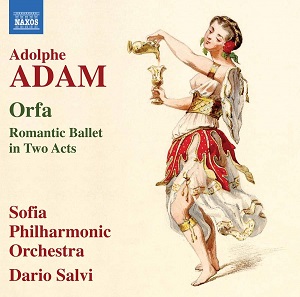
Adolphe Charles Adam (1803-1856)
Orfa, Romantic Ballet in two acts (1852)
Sofia Philharmonic Orchestra/Dario Salvi
rec. 2022, Bulgaria Hall, Sofia, Bulgaria
Naxos 8.574478 [89]
This ballet isn’t widely known, as Adam composed it only four years before his demise, so it received little exposure. His father was a notable composer and a professor at the Paris Conservatoire who had hopes that Adolphe’s early musical education would lead him to become an academic composer. Despite Adolphe’s genuine love of music and being a capable pianist he was reluctant to study musical theory. That inhibition did not deter him from cultivating a successful career in music and he wrote extensively for the stage, composing 70 operas and 14 ballets during his lifetime. Giselle (1841), La Filleule des Fées (1849), and Le Corsaire (1856) are perhaps his best known and most famous ballets. Throughout his career, he was capable of writing delightful and memorable melodies for the theatre. A number of those are evident on this disc and the ones which fire my imagination are found on tracks 2, 3 and 8.
The balletic delicacy of the Sofia Philharmonic’s playing will impress the listener. The first strings are fine; their contribution to the recording is elegant and not to be underestimated. Dario Salvi shows sensitivity in the soft romanticism he brings to the tranquil sections of the ballet, yet elsewhere directs spritely rhythms with panache and his control of dynamics brings out the colour and spirit of the numbers.
Adam’s interest in the work seems to grow as the score progresses, so it should not be judged by the opening number, which to my ears is uneven in development – but without sight of the marrying choreography it would be unfair of me to form any sweeping judgement.
One of the themes in track 3 is somewhat reminiscent of Rossini’s William Tell ballet, which preceded this by 24 years. In track 2 the pizzicato theme is unfortunately indistinct, as is also the lush harp passage in track 5, 7:15 minutes in, the latter tending to be masked by a forward-placed solo clarinet. Later in the CD an adjustment helps the harp become more focused.
This disc provides an amazingly 89 minutes of playing time, made possible by enhanced sampling compression. One need not be concerned of loss of quality because no audible veiling of detail is discernible to the listener. The acoustics are good. The notes are in English and French.
Raymond J Walker
Help us financially by purchasing from





















